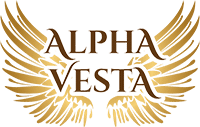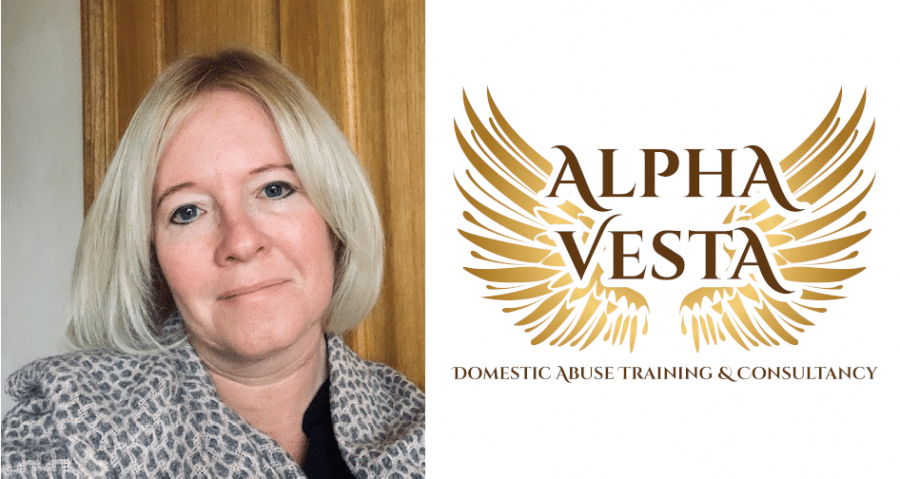To celebrate International Women’s Day 2021 and its theme of “Women in leadership: Achieving an equal future in a COVID-19 world” we interview Lucy Whittaker, the founder of Alpha Vesta.
Lucy, can you introduce yourself and your organisation: Alpha Vesta?
I’m Lucy Whittaker the founding director and lead trainer of Alpha Vesta. We are a community interest company founded by myself in 2019 and we are all about breaking the cycle of domestic abuse through awareness, prevention and early intervention within the workplace.
We deliver on our mission in a number of different ways. We begin with embedding culture and building understanding around domestic abuse across communities and within workplaces. We deliver talks, presentations, training workshops as well as support employers to build policies and procedures around domestic abuse. We also conduct lots of ground level research where we place great importance on frontline practice and lived experience around domestic abuse.
What was your journey to creating Alpha Vesta?
I started to learn about domestic abuse when I worked at a school as a finance and administrative assistant. The troubled children that had been kicked out of class for bad behaviour seemed to gravitate towards me and I used to keep them occupied in my office. As a result, I wanted to understand more about what was causing these problems. So whilst still working within schools, I studied part time at university studying Criminology and Sociology before going on to work in the voluntary sector.
I was subsequently employed by Essex Police Fire and Crime Commissioner as a Specialist Caseworker where I began a career as a complex casework and child protection specialist. That work meant that I was being brought into the process very late, usually at crisis point on cases that were in the system for a long time and with a family where the children were potentially going to go into care. Rather than just responding to crisis all the time, I just thought what are we doing at the other end to prevent crisis in the first place and what happens after?
That’s why I decided to found Alpha Vesta and work at that other end of the spectrum in building awareness and prevention around domestic abuse. There’s such a lack of knowledge around domestic abuse and the complexity that sits around it so I felt there was so much work to be done in that area.
Smallwood’s mission is to enable women to be financially resilient. How would you draw an alignment with Alpha Vesta empowering women to be financially resilient and making good financial decisions?
We know that 1 in 10 will have to leave work because of domestic abuse. But that’s just the ones we know about. Across the course of a career someone suffering domestic abuse will earn around £6k less than someone who doesn’t. There’s also the fear of losing their job because of their absence, lateness or reduction in volume of work. Sometimes the perpetrator is putting so many barriers in front of them to even get to work.
So the link to helping women become more financially resilient is clearly something our support looks to address. Tackling that in the workplace will help women become more financially resilient.
What have been the biggest challenges for your organisation during COVID-19?
When we started our first pilot project in Jan 2020, only to go into lockdown in March, I thought it’s all going to fall apart as I could no longer deliver the talks and presentations in person and I didn’t know about Zoom back then. No one did!
However, a couple of ladies from the local Chamber of Commerce helped me set up Zoom and Eventbrite accounts and helped transfer the presentations online. They took the concept I had and helped make it work.
We launched our first online sessions in April, so only a month after lockdown, on Domestic Abuse and Coronavirus: The Toxic Mix, which reached full-capacity within 24 hours. Smallwood’s funding has enabled us to run more of these sessions since.
We also broke down longer presentations into smaller online sessions and by the end of June 2020 we had everything being delivered online. Every session reached full-capacity and I’m amazed at what we achieved in such a short space of time.
What impact has your Smallwood Trust grant had on your organisation?
The Smallwood Trust grant has been wonderful for us. First of all, it funded us to run 24 online sessions by the end of March 2021.
Secondly, we have developed important awareness sessions on Domestic Abuse and Eating Disorders and Domestic Abuse and Pets. These look at the complex dynamic around the edges of domestic abuse which people might not notice. These sessions help people join those dots together.
Then there’s our really important Policy Development Workshop for employers. Whilst, there’s a lot of talk about employers putting in place a domestic abuse policy, there’s no point doing that without, first, embedding culture and understanding around domestic abuse. Otherwise, it will just become a dusty policy on a shelf. So we support employers with workshops and by identifying drivers in their organisation that can engage with that culture before coming up with a policy.
Part of your Smallwood grant has gone towards developing a survivors symposium. Can you tell us about what this is, and why it’s so important to your work?
We put massive importance in ground level research and lived experience of domestic abuse to drive any response in the workplace. We need to be listening to the people who potentially have the most experience in that area, so the Survivors Symposium offers anyone the opportunity to share their experience of domestic abuse and how it impacted on their employment. This is not just survivors but family members, friends and employers that were concerned about someone. We wanted to capture that real-rounded experience of people.
We are running our final Survivors Symposium event at the end of March 2021 which is an open forum with a number of HR professionals and employers having real in-depth discussions about the barriers for an employer wanting to understand more about domestic abuse. We have to pin that down and we want to give people the opportunity to share their insight in a very non-judgemental way as it’s the only way to find the best way to respond.
Employers can see that employment and jobs are entwined in some of the survivor stories that are talked about. They are powerful stories so we also make sure we make our speakers feel supported and know that we have their back.
The feedback from these sessions have been just as important. We asked the attendees of a recent event ‘how many of you have experienced the impact of domestic abuse in the workplace (you, or a colleague)?’ And 74% said yes. This is shocking and this is why we do what we do.
Out of all areas of life, why do you focus on the workplace as a key site for preventing and understanding domestic abuse?
It came from the research I had done around schools because they are often the perfect place to educate children and they have robust structures around them regarding safeguarding too.
It got me thinking, where is your safe place if you are over the age of 18? Research on victims of domestic abuse said that the safest place that victims felt was at work. So I thought what if we could replicate what we do in schools and put it in the workplace? To create that safe place and that space for learning. Workplaces are valuable places to embed culture and understanding because they are often in a community. They also have support structures such as Health & Safety so the only barrier we have is in creating that understanding of domestic abuse and embedding that culture of awareness.
A workplace has all these tools that can be used to save someone’s life and change their journey completely. Plus, you usually spend more time with your work colleagues than your family so you are more likely to spot something if you had the awareness and skills. It is the perfect place and that’s why we are so passionate about it.
The theme of International Women’s Day this year is Women in leadership: Achieving an equal future in a COVID-19 world. With this in mind, is there a woman in a leadership position that you think more people should know about?
I see leaders everywhere. You don’t have to be a CEO or a patron of a charity, you can be a driver for change anywhere. When I think about the team I have built around me, the people who helped me at the start are leaders and the women who are sharing their survivor stories, they are leaders. It’s about giving hope to everyone. That’s what we have done at Alpha Vesta. When I look at my team and what we have accomplished, how is that not leadership?
How important is it to you to have women in the leading roles of organisations trying to tackle gender inequality?
For me, women are natural leaders. When I look around at the women I work with, my friends, family and in my communities. I’ve got four grown up daughters, singing to their own tune and making their mark on the world and I want them to be able to achieve anything. To live in a world where anything is possible and there’s no barriers.
Then I look at my 16 year-old son and I want him to grow up in a world where he doesn’t look at a woman or anyone as any less or any different. He will see strong women everywhere and hopefully he does with our family. It’s one thing for women to see this but we want men to see that too.
Importantly, women in leadership roles give women who are struggling hope. If you’re in crisis and things are really diabolical, you can see that shining light by learning about another woman’s journey. That story of triumph through adversity, it gives them hope that anything is possible.
What is the best way for the public to support your organisation right now?
The best way is to join one of our workshops which are going to be fully-funded to the end of the year. You can find out about them via the web site: www.alphavesta.com.
For any businesses and employers we offer packages where you can sponsor a session within your community. It shows everyone that you understand domestic abuse and that you care. A lot of employers use them in conjunction with embedding culture and understanding across their workplace by sharing it with their community reaching schools, nurseries and community groups who can attend one of these awareness sessions.
Finally, are there any other points or messages you’d like to make?
Yes, a very important message. If you are reading this and you think you, or someone you work with, might be affected by domestic abuse then please be kind to them and be kind to yourself. Don’t think you can take this on all on your own. It can take time to find the right path and there’s no one-size-fits-all approach.
Someone might be dealing with a complex and spiralling situation and all we ask you to do is to say to them “Are you OK?” Just saying that opens a window, we don’t need to bang the door down as that’s not the way to help somebody that’s being abused. Just noticing that they are not OK is enough.


